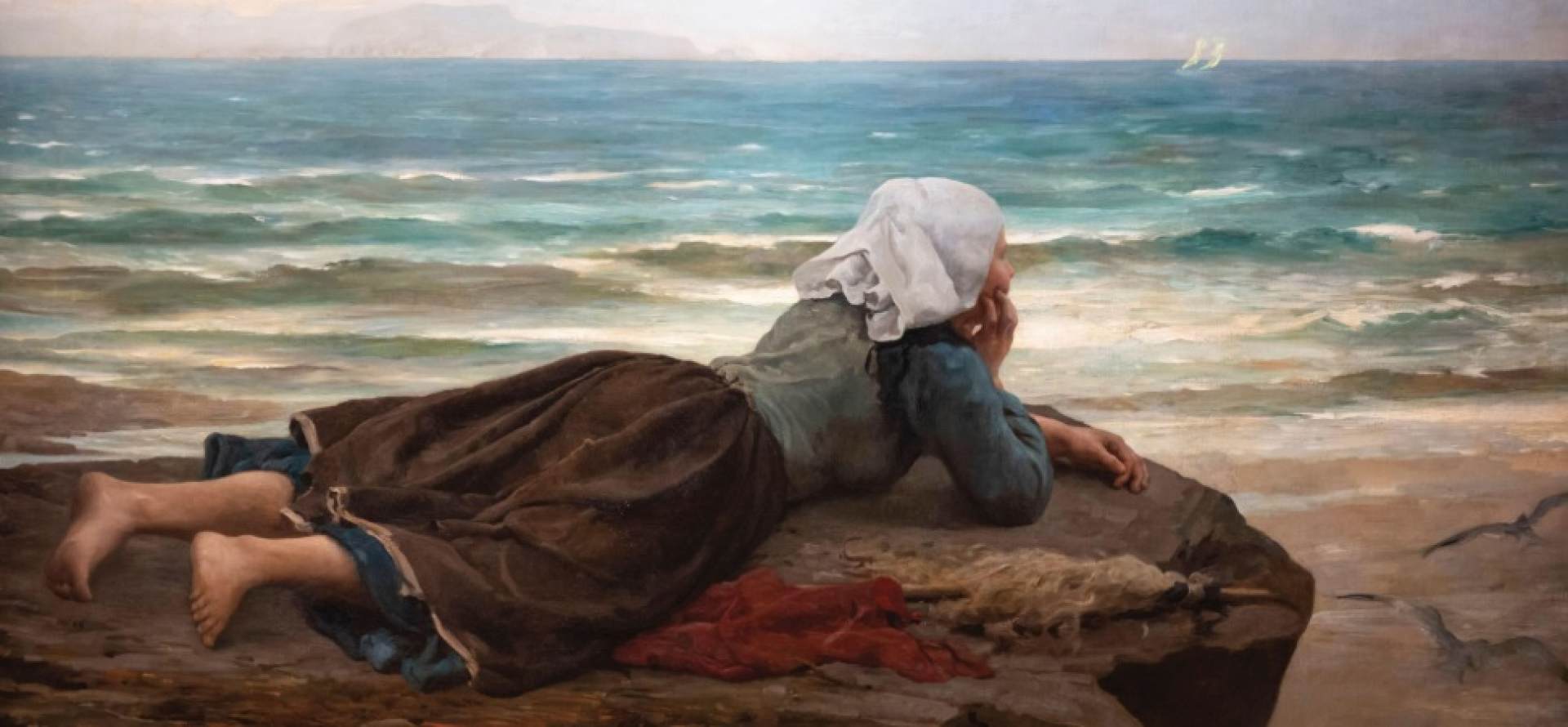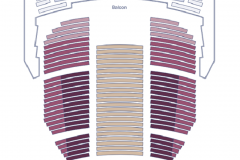The Flying Dutchman
November 2025 | ||||||
|---|---|---|---|---|---|---|
Mo | Tu | We | Th | Fr | Sa | Su |
Semi-staged opera
Romantic opera in three acts
Music and libretto by Richard Wagner (1813-1883)
Premiere: Dresden, Königliches Hoftheater, 2 january 1843
The common threads that run through our season are first spun on this night: mythology, trancelike dreams, and the female power. In Wagner’s opera, the ancient myth about a haunted seafarer seems like the projection of a vivid mind. In order to sail round the Cape of Good Hope, a Dutch mariner once cursed God and the forces of nature. For this, he was condemned to roam the seas, disembarking every seven years until he found a bride who remained faithful until her (!) death.
Senta, a rather overstrung Norwegian girl, and her friends sit at the spinning wheel. Although betrothed to the hunter Erik, her fancy is roused by a painting of a mysterious man. Her father returns from a voyage with a haggard guest, whom she identifies as the object of her dreams. When the two declare their mutual love, Erik storms in. The foreign sailor reveals himself as the Flying Dutchman, once more betrayed. To save him, Senta thrusts herself off a nearby cliff.
The music in Wagner’s early opera depicts the force of nature as romantically as the languor of love. But he also introduces a major subject of his later works: Men may sin, Women must redeem…
Synopsis
Place: On the coast of Norway
Act 1
On his homeward journey, the sea captain Daland is compelled by stormy weather to seek a port of refuge near Sandwike in southern Norway. He leaves the helmsman on watch and he and the sailors retire. (Song of the helmsman: "Mit Gewitter und Sturm aus fernem Meer" – "With tempest and storm on distant seas.") The helmsman falls asleep. A ghostly vessel appearing astern is dashed against Daland's vessel by the sea and the grappling irons hold the two ships together. Invisible hands furl the sails. A man of pale aspect, dressed in black, his face framed by a thick black beard, steps ashore. He laments his fate. (Aria: "Die Frist ist um, und abermals verstrichen sind sieben Jahr" – "The time has come and seven years have again elapsed") Because he once invoked Satan, the ghost captain is cursed to roam the sea forever without rest. An angel brought to him the terms of his redemption: Every seven years the waves will cast him upon the shore; if he can find a wife who will be true to him he will be released from his curse.
Daland wakes up and meets the stranger. The stranger hears that Daland has an unmarried daughter named Senta, and he asks for her hand in marriage, offering a chest of treasure as a gift. Tempted by gold, Daland agrees to the marriage. The southwind blows and both vessels set sail for Daland's home.
Act 2
A group of local girls are singing and spinning in Daland's house. (Spinning chorus: "Summ und brumm, du gutes Rädchen" – "Whir and whirl, good wheel") Senta, Daland's daughter, dreamily gazes upon a gorgeous picture of the legendary Dutchman that hangs from the wall; she desires to save him. Against the will of her nurse, she sings to her friends the story of the Dutchman (Ballad with the Leitmotiv), how Satan heard him swear and took him at his word. She vows to save him by her fidelity.
The huntsman Erik, Senta's former boyfriend, arrives and hears her; the girls depart, and the huntsman, who loves the maiden, warns her, telling her of his dream, in which Daland returned with a mysterious stranger, who carried her off to sea. She listens with delight, and Erik leaves in despair.
Daland arrives with the stranger; he and Senta stand gazing at each other in silence. Daland is scarcely noticed by his daughter, even when he presents his guest as her betrothed. In the following duet, which closes the act, Senta swears to be true till death.
Act 3
Later in the evening, the local girls bring Daland's men food and drink. They invite the crew of the strange vessel to join in the merry-making, but in vain. The girls retire in wonder; ghostly forms appear at work upon the vessel, and Daland's men retreat in fear.
Senta arrives, followed by Erik, who reproves her for deserting him, as she had formerly loved him and vowed constancy. When the stranger, who has been listening, hears these words, he is overwhelmed with despair, as he thinks he is now forever lost. He summons his men, tells Senta of the curse, and to the consternation of Daland and his crew declares that he is "Der fliegende Holländer."
As the Dutchman sets sail, Senta throws herself into the sea, claiming that she will be faithful to him unto death. This is his salvation. The spectral ship disappears, and Senta and the Dutchman are seen ascending to heaven.
Program and cast
Conductor | Gianluca Marcianò
Choirmaster | Stefano Visconti
Daland | Albert Dohmen
Senta | Asmik Grigorian
Erik | Daniel Behle
Mary | Angharad Lyddon
The Steersman | Trystan Llyr Griffiths
The Dutchman | Sir Bryn Terfel
Repetitor | Alessandro Pratico
Choir of the OPÉRA DE MONTE-CARLO
ORCHESTRE PHILHARMONIQUE DE MONTE-CARLO
Grimaldi Forum, Monaco
The perfect setting to stir up your audience. Equipped with exceptional acoustics and high-performance audio-visual equipment, this auditorium is the ideal place for your plenary sessions, awards ceremonies, product launches or other shows. With 1,000 m² of stage area, your event is sure to gain momentum and make a lasting impression!
STAGE SURFACE AREA
1,000 m² with a 690 m² main stage,
185 m² of side stage and 140 m² backstage.
CAPACITY
1,864 seats with foldout tables,
with 516 of these seats in the balcony.
TECHNICAL FEATURES
3 control rooms: sound, projection, lighting
5 simultaneous translation booths

 EN
EN DE
DE IT
IT FR
FR ES
ES RU
RU JP
JP RO
RO
 Seating plan
Seating plan 